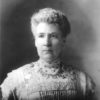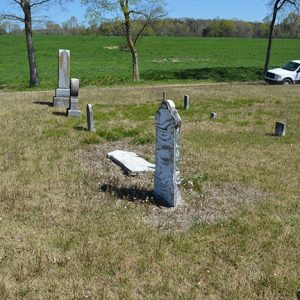calsfoundation@cals.org
Bethel Cemetery
aka: Old Bethel Cemetery
Bethel Cemetery, named after the nearby extinct Bethel Church, is located in the west-central area of Lawrence County, in the vicinity of the former rural town of Denton (Lawrence County). The cemetery is listed in the National Register of Historic Places under Criterion A with local significance for its association with the early exploration and settlement of that community.
Denton, a now-defunct town located six miles west of Powhatan (Lawrence County) on State Highway 117, is one of several communities that experienced a slow decline after railroad companies built tracks through eastern Lawrence County. Situated in the Flat Creek valley, Denton sprang up at the crossroads of the Military Road and the Powhatan-Smithville Road. Settlers began arriving about 1850. Some would ultimately be buried in the Bethel Cemetery, including W. J. Matthews (arrived in 1852), John Davis (arrived in 1854), and Thomas J. Guthrie (arrived 1854). Most of the area’s new residents were farmers, growing cotton or tobacco, though some made money blacksmithing or producing sorghum molasses. Settlement in Denton slowed as the Civil War gripped the country; Lawrence County as a whole lost thirty-six percent of its population between 1860 and 1870.
The construction of the railroads in the 1870s and 1880s revived settlement in Lawrence County, and though the tracks bypassed Denton, the community continued to thrive over the next half-century. Several merchants operated in the town during this period, including Henry Moore, Will Penn, Con Sullivan, and David Davis, who became Denton’s first postmaster when the federal government established a post office there on March 6, 1894. The community also boasted a gristmill, two cotton gins, two doctors, and even a milliner shop around the turn of the century. At its peak, Denton consisted of about fifty homes and businesses.
Like many southern communities, Denton was home to a number of churches representing various denominations. The first house of worship in the area was New Hope Church, built by the Primitive Baptists in about 1818. Disagreement within the congregation in the 1830s led to a split, and the name of the church was changed to Bethel Church. Another New Hope Baptist Church, evidently unrelated to the previous one, was established in July 1844 and remains in operation today. The Methodists also had a church building in Denton, which was moved in from Rock Cove in 1923. The churches housed other activities besides religious services, including a singing school in 1903. Held at New Hope Baptist Church, the event was taught by a traveling instructor who trained local residents to read music and sing. By 1910, Denton also boasted a Masonic lodge and Odd Fellows lodge, and local residents formed a brass band in 1912.
The majority of the people whose names appear in the list of historic burials were members of pioneer families who settled in the Denton community and their descendants. Interred in Bethel Cemetery are businessmen, including the founder of the former town of Denton; numerous military servicemen including many Civil War veterans and their spouses; clergy, teachers, farmers, and ranchers; and other members of the community. The earliest grave in Bethel Cemetery dates to 1858, while the most recent burial in the cemetery was in 2012.
For additional information:
“Bethel Cemetery.” National Register of Historic Places nomination form. On file at Arkansas Historic Preservation Program, Little Rock, Arkansas. Online at http://www.arkansaspreservation.com/National-Register-Listings/PDF/LW0180.nr.pdf (accessed October 27, 2021).
Biographical and Historical Memoirs of Northeast Arkansas. Chicago: Goodspeed Publishing Co., 1889.
Cole, Gussie Davis. “Continuation of the Denton History.” Lawrence County Historical Quarterly 10 (Winter 1987): 5–32.
———. “A Look at the Earlier Denton History.” Lawrence County Historical Quarterly 9 (Fall 1986): 5–12.
Lawrence County, Arkansas: 1815–2001. Paducah, KY: Turner Publishing Company, 2001.
Benjamin Harvey
Arkansas Historic Preservation Program
 Historic Preservation
Historic Preservation Louisiana Purchase through Early Statehood, 1803 through 1860
Louisiana Purchase through Early Statehood, 1803 through 1860 Bethel Cemetery
Bethel Cemetery 




Comments
No comments on this entry yet.